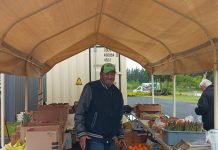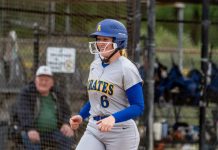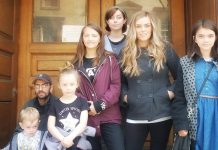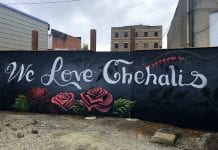Now in its second year, the Lewis County Youth Mentorship Program is already making a positive difference in the lives of Lewis County youth thanks to the inspiration, guidance and encouragement of supportive adult mentors.
The program was created in 2022 to support at-risk youth ages 12-17 in Lewis County. Coordinated by the Lewis County Juvenile Court, the program’s mission is “to inspire youth through meaningful relationships to make positive choices that build resiliency, encourage growth and enable them to pursue a successful future.”

The Need for Mentors is Greater Than Ever
“I just want someone to listen to me,” — Lewis County youth.
In our community, just as in many communities across the nation, there has been an alarming increase in the number of teens struggling mentally and emotionally–especially in the wake of COVID. Depression, anxiety, substance abuse, skipping school and delinquency are just a few of the symptoms. Without a strong support system and positive role models, some of these youth make poor decisions that land them in the Juvenile Justice system.
Surprisingly, that’s exactly where the idea for this community youth mentorship program began. The probation staff at Lewis County Juvenile Court saw the need and wanted to make a difference. “We asked ourselves what we could do to help youth stay out of the system,” said Lee Montgomery, a probation officer at Juvenile Court who was instrumental in developing the program. “So, we decided to be proactive and create a formal mentor program open to all youth who live in Lewis County.”

Why a Mentorship Program?
Studies show that the teen years are key to brain development. During these formative years, the amygdala, or the brain’s emotion center, becomes extremely active, and emotions tend to rule decision-making. Because of this, youth are more prone to be risk takers, impulsive, misinterpret social cues, have accidents, get into fights, and engage in risky behavior.
The good news is that having a consistent positive adult mentor can not only reduce negative behaviors and depressive symptoms in youth but can also promote positive social attitudes and increase academic success.
According to research from Public/Private Ventures study of Big Brothers Big Sisters: The Mentoring Effect, 2014 and The Role of Risk, 2013, at-risk youth who meet regularly with mentors are:
- 46% less likely than their peers to start using illegal drugs
- 27% less likely to start drinking
- 52% less likely to skip a day of school
- 37% less likely to skip a class
- 81% more likely to participate regularly in sports or extracurricular activities
- 55% more likely to enroll in college
- 130% more likely to hold a leadership position at some point in their life

Mentors are Making a Difference in Our Community
“A mentor is someone who sees more talent and ability within you than you see in yourself and helps bring it out of you,” — Bob Proctor.
What began as a dream a few years ago is now in its second year and growing. Though the program started with just a handful of mentors and mentees, the results so far are proving the research true.
“One young man used to go to school with his hood up was quiet and withdrawn, never looked at anyone, and struggled in academics. He was matched with a mentor who listened to him, encouraged him and was supportive. After participating in the program for several months, his teachers began to notice a difference. He started coming to school with his hood down, smiling, talking with staff, looking at people in the eye, and turning in his schoolwork,” said Lisa Leon, the initial program coordinator. This Lewis County student won the One Percenter Award for improvement.
Another Lewis County youth who lived with her extended family struggled with anxiety and social issues. Through the program, she gained enough self-confidence to apply to a state university. She is now attending that university on a full-ride scholarship.
Stories like these are precisely what Montgomery, Leon and their team of mentors and community partners hope to see more and more in Lewis County as the program grows. But they have a long road ahead of them.

More Mentors Needed
“Be the person you needed when you were younger,” — Ayesha Siddiqui.
As of August 2024, the Lewis County Mentorship Program had 32 mentees but only ten adult mentors. “We have more youth than we have mentors, so we definitely have a need for more adult volunteers,” said Montgomery.
Montgomery took on the coordinator role this summer when Leon stepped into another position at the Juvenile Court, but Leon continues to be involved in the program.
In an effort to recruit more adult mentors, Montgomery, Leon and the Lewis County Juvenile Court staff operated a booth at the Southwest Washington Fair to share about the program. They were encouraged by the positive community response and the number of people who expressed interest.

How the Program Works
Adults who apply to be a mentor are first interviewed, background-checked and carefully vetted before joining the program. There are also strict safety guidelines in place. For example, mentors only meet with their mentees in public places or with a group, never alone. “We also require eight hours of initial training and provide ongoing training,” said Montgomery. That training includes roles and responsibilities, safety restrictions, tools for building a relationship, a basic understanding of some of the trauma and challenging issues these teens face and how to best respond.
Then, mentors can choose how they want to be involved. Depending on their availability, there are two different roles to choose from: a one-on-one mentor or a group outing mentor.
The most impactful and rewarding role is the traditional one-on-one mentor. Each one-on-one mentor is matched to a youth with similar interests, so they have common ground to develop a relationship. Their role is to be a consistent, caring presence and to encourage and support their mentee. The minimum time commitment for a one-on-one mentor is one year.
The role of a group outing mentor is an excellent option for those with busy schedules. These volunteers come along on group outings and spend the day interacting with youth mentees. Led by Juvenile Court staff, these day trips and evening activities provide experiences where all mentees — including those who are unassigned to a mentor — can be positively impacted by caring adults. While the goal is to match every at-risk youth with a one-on-one mentor, group outing mentors can make a positive difference for those who are still waiting.

Positive Community Partnerships
From the start, community partners, local businesses and the county government have jumped on board to support the mentorship program. Local businesses have donated equipment like kayaks, bikes, fishing poles and stand-up paddle boards to encourage mentors to spend time outdoors with their mentees. “We’ve taken youth mountain biking, hiking to waterfalls and scenic viewpoints, snowshoeing and to the beach,” said Montgomery. “One of the most popular activities so far has been a weekly craft night.”
Other generous sponsors have donated tickets to Rainiers baseball games, the LeMay Car Museum, Woodland Park Zoo, Point Defiance Zoo and the Pacific Science Center. Mike Flood, VP of Community Engagement for the Seattle Seahawks, heard about the program and invited a group of mentees to be VIPS one day at the Seahawks Training Camp. That was an incredible experience not only for the mentees but also for the mentors.
“The purpose for these outings is to provide opportunities for the mentors and mentees to connect while doing something fun and memorable,” said Montgomery. “For many of these youth, it’s their first time experiencing these kinds of activities.”

How To Get Involved in the Lewis County Youth Mentorship Program as a Mentor or Mentee
The Lewis County Youth Mentorship Program seeks caring, supportive adults who want to make a difference in the lives of struggling youth.
The program is also seeking youth mentees. Youth can be referred by teachers, counselors or family members, or they can refer themselves.
If you are interested in signing up to be a mentor or know a Lewis County youth between the ages of 12 and 17 who could benefit from the program, visit the Lewis County Youth Mentorship Program website or contact the program director, Lee Montgomery, at lee.montgomery@lewiscountywa.gov or 360.740.2682.














































